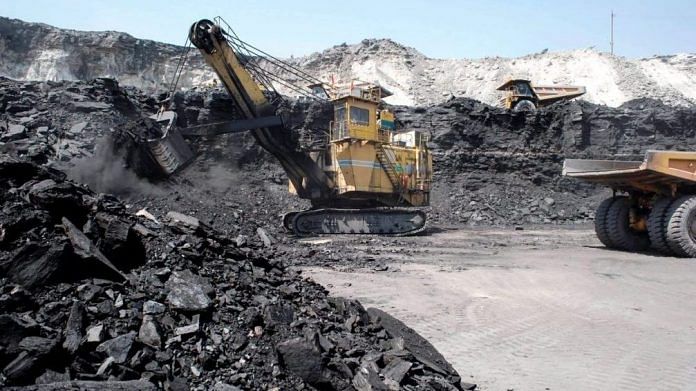In 2017-18, India imported 208 million tonnes of coal, up from 191 million tonnes the previous year, and between April and Nov 2018, imports rose by over 9%.
New Delhi: Just about three months before the Lok Sabha elections, the NDA government finds itself with little reason to cheer when it comes to the coal sector.
Coal accounts for 70 per cent of the power generated in India, and Narendra Modi’s administration had promised to end coal imports by 2016 by increasing domestic supply. The announcement was made in 2014 by Piyush Goyal, the then-Minister of State with Independent Charge for coal.
But in 2017-18, India imported 208 million tonnes of coal, higher than the 191 million tonnes imported in 2016-17. The coal import bill also went up to $22,901.23 million (approx. Rs 1.63 lakh crore) in 2017-18 from $15,759.93 million (Rs 1.1 lakh crore) the previous year.
The figures are still rising in 2018-19. In the April to December period, the quantity of coal imported stands at 171.81 million tonnes compared to 161 million tonnes in the corresponding period last year, to a PTI report quoting Mjunction Services, a B2B e-commerce joint venture by Tata Steel and SAIL. The April-November coal import bill has risen by 23 per cent over the corresponding period last year — $17,555.75 million (approx. Rs 1.25 lakh crore) compared to $14,271.30 million (Rs 1.01 lakh crore).
One of the Modi government’s top priorities when it took charge was to announce e-auction of coal blocks. But that exercise has not managed to generate any significant response.
Failing to get off the ground
India is the world’s fourth largest coal producer but continues to face a huge shortage in its supply, primarily due to faulty mining policy and the cancellation of coal block allocations in 2014, following the Comptroller and Auditor General’s (CAG) report.
On 20 February 2018, the government decided to throw open the sector to private participation, which was touted as a historic move that reversed the nationalisation of the sector under Indira Gandhi in 1973. The Cabinet Committee on Economic Affairs approved the methodology for the auction of coal mines and coal blocks.
The move was aimed at boosting healthy competition, increasing supply, thereby reducing imports and ending the monopoly of Coal India Ltd. But, 11 months on, the proposal is still on the drawing board.
“It’s time the government walked the talk and opened up commercial coal mining to the private sector,” an industry analyst said. “This will not only attract global coal mining majors, but will also bring new technology and best practices to a sector that has been a public sector monopoly. If the process is started now, India will have self-sufficiency in coal in the next decade.”
Also read: Indian power plants not operating to full capacity as coal imports drop by 32 per cent
Huge ramifications
Besides power generation, coal is a critical resource for steel and cement production, among other things. A shortage of coal, therefore, has huge ramifications for the economy.
“Now, with a combination of higher global coal prices, higher imports and a depreciated rupee, the coal import bill in the current financial year is likely to surpass last fiscal’s bill by a wide margin,” another analyst told ThePrint.
The Reserve Bank of India has already raised concern over the impact of coal imports on the current account deficit.
Poor availability of local coal has impacted the captive power plants (CPPs) the most. These coal-fired CPPs across sectors like aluminium, cement, steel and fertilisers have a combined capacity of 28,000 MW and an annual coal requirement of 188 million tonnes.
Industry insiders say supplies to CPPs have been patchy, leading to uncertainty. Stock levels have reached a critical point.
These industries are being forced to either import expensive coal or buy power from the grid at exorbitant prices. This also contravenes legally binding fuel supply agreements with Coal India for long term fuel supplies, an industry analyst said.
Meanwhile, the government has also set up a committee of secretaries to look into the issue.
This article has been updated to include the latest coal import figures from December 2018.




India importing coal is like gulf countries importing crude oil.In fact India should be exporting coal n earning FE instead of spending them.Coal import looks to be a corrupt practice due to corporate-politicians nexus to divert n park money abroad thru overinvoicing using front cos in gulf.lnvestgations against no. of cos.are in progress but it will go on endlessly for obvious reasons.
Yeh sab baatein general election campaign mein ki jayengi. Our TV screens have been plastered with all manner of trivia, which has little relevance to our national well being and interest. There will be debates, in different formats, all over the country on how much progress we have made since 2014. Both incumbent and challengers should prepare for a sharp, incisive conversation.